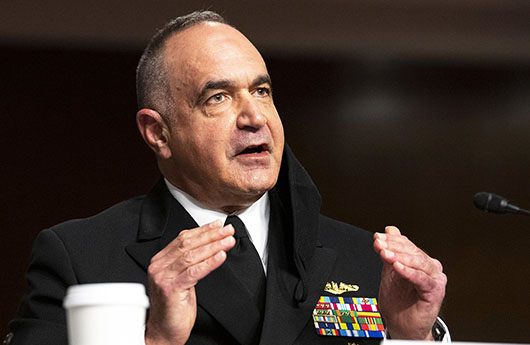FPI / May 11, 2022
U.S. Strategic Command currently has “the absolute minimum” forces to deter both China and Russia, Adm. Charles Richard, the Stratcom commander, said during a Senate hearing.

Adm. Richard said the debate within the U.S. military and intelligence community two years ago was whether the communist regime in Beijing would double its nuclear warhead arsenal within a decade.
“That’s already happened while I’ve been the commander of U.S. Strategic Command,” he said. “Whatever the intelligence community tells you about what China‘s going to do, divide it by two in time and you’ll probably be closer to what happens.”
Adm. Richard testified before the Senate Armed Services strategic forces subcommittee that the United States is facing what he termed “crisis deterrence dynamics” in confronting China and Russia that the nation has faced only several times.
Russian President Vladimir Putin launched the invasion of Ukraine using “thinly veiled nuclear threats to deter U.S. and NATO intervention,” he said.
Farther east, China “is watching the war in Ukraine closely and will likely use nuclear coercion to their advantage in the future,” the four-star admiral noted.
“Their intent is to achieve the military capability to reunify Taiwan by 2027, if not sooner,” Adm. Richard said.
Richard’s warnings on “absolute minimum” forces appear to be out of step with the policies of the Biden administration.
In April, the Biden administration announced a unilateral test ban on anti-satellite (ASAT) weapons, believing it could persuade China and Russia to follow suit.
“Sadly, there already is a long history of America’s enemies professing interest in banning ASATs and other space weapons, while building them just the same and then campaigning for new international agreements that tend to constrain the United States more than them,” Richard Fisher wrote in an April 19 analysis for Geostrategy-Direct.com. He added:
The Biden Administration’s unilateral ban on ASAT weapon testing comes soon after its Nuclear Posture Review, that reportedly has cancelled the Trump Administration’s tactical nuclear warhead armed Sea Launch Cruise Missile-Nuclear (SLCM-N), that was designed to begin to give U.S. forces a means to deter far superior Russian and Chinese theater nuclear weapons.
But like the SLCM-N decision, the Biden ASAT weapons test ban emerged from progressive arms control constituencies aligned with the Democrat Party that long have been advocating for U.S. ASAT development and testing bans regardless of the growing threats from China and Russia.
The expansion of China’s missile silos took place in just a few years and Xi Jinping has also seen the number of road-mobile ICBMs at his disposal doubled. The nuclear strike weapons are difficult to track as part of strategic deterrence.
Full Text . . . . Current Edition . . . . Subscription Information
FPI, Free Press International
